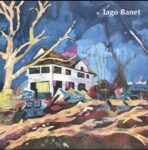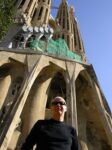 When you think that this is the year music went over the cliff (well, live music certainly) we’ve been pretty busy with album reviews as artists faced difficult choices about whether to release their material in a time when they couldn’t tour to promote it. Despite those difficult decisions, we still reviewed over thirty albums this year and we asked Allan to pick out five of his personal favourites.
When you think that this is the year music went over the cliff (well, live music certainly) we’ve been pretty busy with album reviews as artists faced difficult choices about whether to release their material in a time when they couldn’t tour to promote it. Despite those difficult decisions, we still reviewed over thirty albums this year and we asked Allan to pick out five of his personal favourites.
I’ve always loved the MusicRiot ethos of reviewing; it’s not about trashing albums that we aren’t keen on, it’s about highlighting the albums that we really like and telling the world why we like them. We don’t review high profile albums, nothing we say will help Springsteen, Dylan or Young sell half a dozen more units, but we might actually help someone self-releasing their work, even if it’s only with a quote to use on their next press release. Now I’ve got that out of my system, I’ll tell you about five albums that I’ve had on high rotation this year. As always, in no particular order:
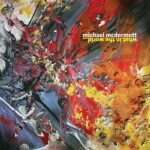 “What in the World” – Michael McDermott
“What in the World” – Michael McDermott
Michael McDermott keeps cropping up in these year end lists, with good reason. He’s a great songwriter and he knows how to present his songs on record and live. “What in the World” was a bit of a departure for Michael; his focus has shifted towards protest songs. When Michael takes a pathway, he commits to it completely. The title song is “Subterranean Homesick Blues” for 2020; it’s a headlong rush through the final year of Trump’s presidency and pulls no punches – ‘It’s not hard to see The President’s a criminal’. While “What in the World” is one of only two protest songs on the album (the other is “Mother Emanuel”), its power and ferocity mean that it defines the album, although there are plenty more songs from Michael’s post-addiction and recovery space to make a great and varied album.
This one was very different from the MusicRiot staples. Maya Rae isn’t the kind of artist we usually hear about from our sources. She sent a demo tape to producer Steve Dawson (Black Hen Records) and he hastily put a band together to record the album in three days. Maya wasn’t even eighteen at the time and she had already been singing professionally for six years. The album’s fresh and zingy and full of the insights about young people’s lives that you can only get from a young person. The musicianship on the album is superb as the band step effortlessly from pop to sinuous funk. Try it, you’ll love it.
I don’t think I’ve ever featured an entirely instrumental album before in my High Fives, but I’d never heard “Iago Banet” before this year. Iago plays in a style that he describes as Galician finger-style from south, south, south, south London. If you haven’t seen Iago play live you would think that each song features at least two guitarists (a bit like Martin Harley’s Weissenborn playing), but only one track on the album features a second guitar and that’s the fun blues hybrid ”Octopus One”. Iago’s playing evokes pictures ranging from Greater London scenes (“Morning at Greenwich Park”) to more prosaic domestic scenes (“There’s a Mouse In my Kitchen”). And there’s also a wonderful swing arrangement of Van Morrison’s “Moondance”. What more could you want?
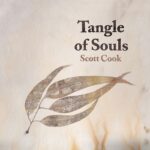 “Tangle of Souls” – Scott Cook
“Tangle of Souls” – Scott Cook
To paraphrase the Marks & Spencer advertising strapline, this isn’t just music. “Tangle of Souls” as a standalone album is a superb piece of work, but it comes packaged with a hefty booklet containing Scott’s writings, printed on had-crafted paper. It all adds to the experience, but the album stands on its own musical and lyrical merits. The album’s centrepiece “Say Can You See” is a political statement that isn’t partisan; it’s about not trusting anyone from the DC elite. The album has more of a political edge than some of Scott Cook’s earlier work, including an update of Dick Blakeslee’s “Passin’ Through”, which includes a reference to 1970s Chilean martyr Victor Jara. It’s an album that will make you listen and make you think.
 “The Sleepless Kind” – Andy Fleet
“The Sleepless Kind” – Andy Fleet
This was another one that came out of left field. Andy is a musician who makes a living in the same way as a lot of musicians these days; a bit of performance, a bit of recording, a bit of teaching and a bit of anything else that comes along. “The Sleepless Kind” tells the stories of the musicians who entertain us in our clubs and bars every night (or did before the onset of this plague) and gives us a unique perspective on Soho through the eyes of an owl. It’s an album that rewards repeated plays and has an end of the day feel to it. You should probably listen while nestling a single malt in one hand.
And here’s a little bonus ball for you. I wouldn’t normally include a compilation in this selection, but this one merits a mention.
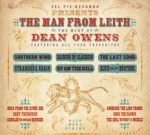 “The Man from Leith” – Dean Owens
“The Man from Leith” – Dean Owens
This is a seventeen-song Dean Owens retrospective. I’ve followed Dean’s work for nearly ten years now and he’s a songwriter who writes beautifully about Scottish and global themes. There are songs about family, songs about friends, songs about events and even a sing inspired by Ronnie Lane. If you want an introduction to Dean’s body of work, then this is the perfect place to start. And whether he’s playing solo or with a band you should try to see him live as well.
 If anyone asks, I’ll always identify as Scottish. In terms of music, it’s a heritage that I tap into. There’s a Celtic feel to many Scottish writers and performers that strikes a chord and I guess it’s because of shared cultural references (it applies to books as well; I love Ian Rankin’s novels, among others). But enough about me; this is all about Dean Owens and his latest album, a greatest hits package titled “The Man from Leith”. Many of the themes of the songs are universal, but there’s also a clear Scottish theme that runs through the album (the title might be a giveaway).
If anyone asks, I’ll always identify as Scottish. In terms of music, it’s a heritage that I tap into. There’s a Celtic feel to many Scottish writers and performers that strikes a chord and I guess it’s because of shared cultural references (it applies to books as well; I love Ian Rankin’s novels, among others). But enough about me; this is all about Dean Owens and his latest album, a greatest hits package titled “The Man from Leith”. Many of the themes of the songs are universal, but there’s also a clear Scottish theme that runs through the album (the title might be a giveaway).
Dean’s been releasing work as a solo artist for about twenty years now and, with a release about every three or four years (not including collaborations and side projects), that’s a substantial back catalogue. Although Dean’s an album, more than a singles, artist, there are still standout songs that have been tried and tested live and are consistently popular. These are the songs that Dean has played solo, as a duo with various guitar players and with various band configurations (with some incredible musicians) and they’ve been thoroughly road-tested; they’re all great songs.
Dean imbues his songs with a very clear sense of place, whether it’s Scotland or the arid desert of Arizona and he loves to tell a story. More than half of the songs on “The Man from Leith” are set in Scotland, particularly Edinburgh (with the obvious exception of “Raining in Glasgow”) and Dean has a genuine appreciation of Scottish songwriters who paved the way for the latest generation and might not be particularly famous outside Scotland (including luminaries like Rab Noakes and Michael Marra).
“The Man from Leith” is seventeen songs spanning Dean’s solo career, demonstrating the range of his songwriting skills from the intensely autobiographical (“Man from Leith” about Dean’s dad and “Baby Fireworks” about his daughter) to the anthemic Ronnie Lane/Ian McLagan tribute “The Last Song”, co-written with Will Kimbrough. If you’re not moved by those songs, your heart is a swinging brick and you shouldn’t even be reading this. And “Lost Time”, which closes the album, is a poignant reminder that we don’t get a second chance at life; make the most of it while you can. In fact the album closes with a run of three songs, “Raining in Glasgow”, “The Last Song” and “Lost Time” that bears comparison with any closing trilogy I’ve heard.
While I’m on the subject of song themes, not all songs are written in the first person; I’ve seen one review of this album get that really badly wrong. Great songwriters pull out themes from their own lives but also the lives of their friends and from stuff that they see on the news or in the papers; don’t make the assumption that everything’s autobiographical, there’s much more to songwriting than that. If you see Dean live, chances are he’ll tell you the stories behind the songs. That’s the best way to get an insight and you’ll probably get a laugh as well; Dean’s songs might be somewhere between melancholy and miserable but he has a wicked, dry sense of humour that you can only appreciate if you see him live.
So, is “The Man from Leith” the best of Dean Owens? It captures the breadth and depth of Dean’s songwriting from the autobiographical “Raining in Glasgow” to the historical WW1 song “Closer to Home” and everything else in between. There isn’t anything even resembling a mediocre song here, and I haven’t even mentioned the award-winning “Southern Wind” (co-written with Will Kimbrough) yet. Die-hard fans might pick out other songs that they think should be included, but this is a pretty good selection. If someone gave me this album and I hadn’t heard any of the songs previously, I’d be really chuffed. Is that good enough for you?
If I’ve met you at a gig, I might have mentioned that “The Last Song” is an absolute anthem; I’m more convinced of that every time I hear it live. Things aren’t looking too good for live music at the moment, but this will certainly give a good impression of what a Dean Owens gig sounds like.
“The Man from Leith” is available on CD and vinyl on Eel Pie Records from 20th March 2020.
As you can see from the piece below, Dean Owens has had a pretty eventful 2015 (including four London gigs, the release of his album “Into the Sea” and the two major events at the end of the piece). We’re pleased he’s had a chance to slow down a little and tell us about some of his personal highlights this year. Dean’s also given us a substitute for his five-a-side team, so we’ve decided to include that as well.
 “All the Light we Cannot See” by Anthony Doerr. A really poignant and moving story, beautifully written.
“All the Light we Cannot See” by Anthony Doerr. A really poignant and moving story, beautifully written.
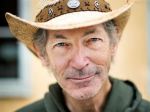 A gig I really enjoyed was Doug Seegers at the Southern Fried Festival in Perth. Kind of took me by surprise. His is a great story of survival. Check out his debut album “Going Down to The River” which was produced by my friend Will Kimbrough.
A gig I really enjoyed was Doug Seegers at the Southern Fried Festival in Perth. Kind of took me by surprise. His is a great story of survival. Check out his debut album “Going Down to The River” which was produced by my friend Will Kimbrough.
 A big highlight for me was seeing my team Heart of Midlothian win the league and promotion. It was great to be at the matches with my dad (the inspiration for Dean’s beautiful song “The Man from Leith”).
A big highlight for me was seeing my team Heart of Midlothian win the league and promotion. It was great to be at the matches with my dad (the inspiration for Dean’s beautiful song “The Man from Leith”).
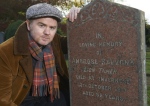 Visiting the grave of my great, great Grandfather Ambrose Salvona (the lion tamer) with my dad in the Scottish Highlands. Ambrose features in the song “Dora” from my new album “Into the Sea”. It’s a great story.
Visiting the grave of my great, great Grandfather Ambrose Salvona (the lion tamer) with my dad in the Scottish Highlands. Ambrose features in the song “Dora” from my new album “Into the Sea”. It’s a great story.
 Finally doing a session for legendary presenter Bob Harris at BBC Radio 2 was special. It was kind of strange sitting opposite the great man and singing a couple of songs for him. Strange in a nice way.
Finally doing a session for legendary presenter Bob Harris at BBC Radio 2 was special. It was kind of strange sitting opposite the great man and singing a couple of songs for him. Strange in a nice way.
 Opening for Roseanne Cash at Union Chapel in London was one of the best shows I’ve ever played. Such a beautiful venue. It was a magical evening. (This event also got a mention in one of Allan’s High Fives this year).
Opening for Roseanne Cash at Union Chapel in London was one of the best shows I’ve ever played. Such a beautiful venue. It was a magical evening. (This event also got a mention in one of Allan’s High Fives this year).



